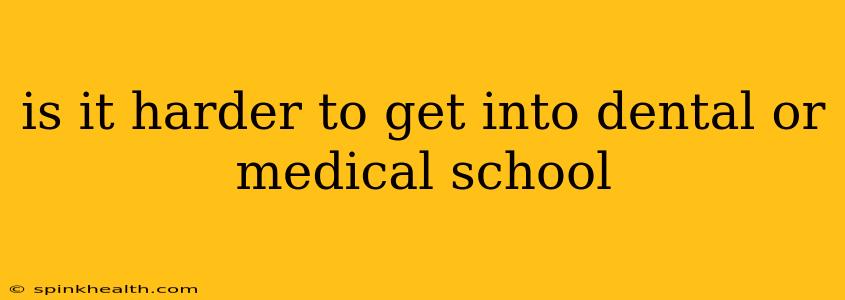Is it Harder to Get Into Dental or Medical School? The Great Admissions Race
The age-old question: dental school or medical school? For aspiring healthcare professionals, this choice often boils down to more than just a preference for teeth versus internal organs. The path to either is paved with rigorous academic requirements, demanding extracurricular activities, and the ever-present shadow of a highly competitive admissions process. So, which is harder? The truth is, it's not a simple answer. It's more like comparing apples and oranges, with both fruits being incredibly challenging to attain.
Let's embark on a journey through the intricate world of medical and dental school admissions, comparing the hurdles, challenges, and ultimately, the success rates, to shed light on this frequently asked question.
What Makes Medical School Admissions So Competitive?
The sheer volume of applicants vying for a limited number of seats in medical school is a significant factor. Imagine a vast ocean of hopeful physicians, all swimming furiously towards the same small island of acceptance. This intense competition drives up the required GPA and MCAT scores, demanding near-perfection from applicants. The emphasis on research experience, volunteering, and shadowing medical professionals adds another layer of complexity. The pressure is palpable, the stakes incredibly high. It's a marathon, not a sprint, and many talented individuals fall short.
The Dental School Admissions Landscape: A Different Kind of Pressure
Dental school, while equally demanding, presents a distinct set of challenges. The DAT (Dental Admission Test) replaces the MCAT, requiring a different skillset and preparation strategy. While GPA remains crucial, the emphasis on hands-on skills and experience in a dental setting becomes paramount. Think intricate dexterity, a steady hand, and the ability to work effectively under pressure – all traits vital for a successful dentist. The competitive landscape is fierce, but the pathway to success might feel slightly different.
What About the Acceptance Rates? A Closer Look at the Statistics
While precise acceptance rates fluctuate annually depending on the specific school and program, both medical and dental schools boast notoriously low acceptance rates. This makes a direct comparison difficult, as the numbers alone don't fully capture the nuances of each application process. What truly matters is the holistic review of each applicant.
Does One Path Require More Years of Schooling?
Both pathways require extensive education. Medical school typically involves four years of rigorous study, followed by residency training (which can vary significantly in length depending on the specialty). Dental school is generally four years long, followed by various residency options for specialization. So, the overall time commitment is relatively similar, making the "harder" aspect more about the intensity of the admissions process rather than the length of the program.
How Does the Application Process Differ?
The application processes for both medical and dental school are rigorous and require meticulous preparation. Both require strong academic records, standardized test scores, letters of recommendation, personal essays, and interviews. However, the specific requirements and focus vary; medical school applications often place greater emphasis on research experience, while dental school applications may prioritize shadowing or hands-on experience in a dental setting.
What Are the Differences in Specialties and Career Paths?
Beyond the initial education, the career options and specializations within medicine and dentistry are vast and varied. This aspect of the decision should be considered carefully, as both careers offer a myriad of exciting and fulfilling opportunities.
The Bottom Line: It's About the Right Fit
Ultimately, deciding whether medical or dental school is "harder" is subjective and depends heavily on an individual's strengths, interests, and personality. Both paths demand immense dedication, resilience, and a genuine passion for helping others. The "harder" school is simply the one that presents a greater challenge to you. Focus on your strengths, passions, and choose the path that best aligns with your aspirations and capabilities. The real challenge lies in self-assessment, strategic planning, and unwavering perseverance throughout the application and educational processes.

